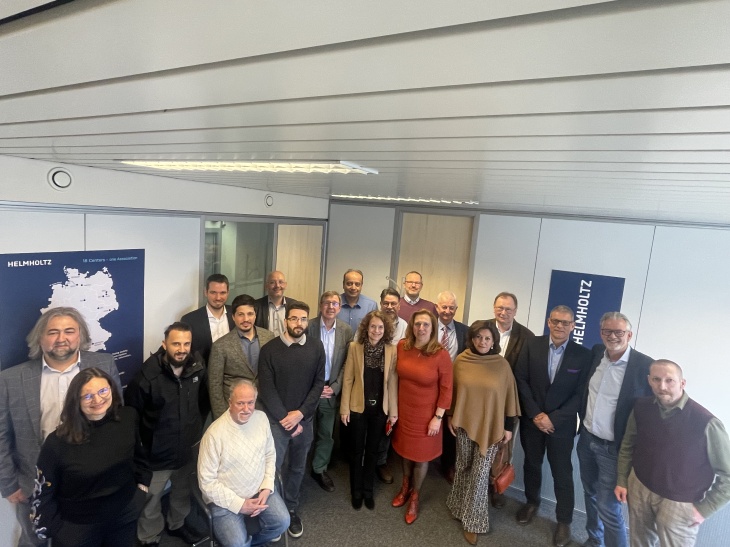Digital ID for innovative advanced materials
Creating new, innovative materials is vital to the industry. However, any new product raises the question of how it can be produced and later recycled in the most sustainable and climate-friendly way possible. The new EU project DigiPass, coordinated by the Helmholtz-Zentrum Hereon, is dedicated to these questions. DigiPass promotes the exchange of digital material data between industry and research institutions, laying the foundations for a digital material and product passport. According to our vision, this passport should contain all relevant information about the material, its origin, processing and environmental impact on all stages of its lifetime. At the end of its life, the collective product information will enable recycling companies to process materials more effectively, resulting in more sustainable solutions and helping minimise the material's overall environmental impact.

The DigiPass partners at their kick-off meeting in Brussels. Photo: Hereon/ Natalia Konchakova
Mitigating climate change is one of the most pressing problems of our time. Digitalisation can play a decisive role in this: A recent study by the Bitkom association shows that the consistent use of digital solutions could reduce annual CO2 emissions by 73 million tons by 2030. That would be almost a quarter of what Germany needs to cut to meet its climate targets by 2030. However, Europe must significantly accelerate digitalisation in the coming years. Experts are talking about a twin transformation - a combined process of change towards green and digital technologies and a comprehensive circular economy.
"DigiPass will support this transformation process now, thereby significantly accelerating the changing process," says Hereon researcher Dr Natalia Konchakova, the project coordinator. "Namely in using innovative materials tailored to their intended purpose." These include new composite materials, alloys and coatings, electrically conductive plastics and speciality chemicals. At present, it is not easy to use these materials in a truly sustainable way. One example is recycling: "As a rule, manufacturing a high-tech product is highly complex," emphasises Dr Peter Klein from the Fraunhofer Institute for Industrial Mathematics ITWM in Kaiserslautern, one of the project partners. "A recycling company usually has no chance of untangling this complex web and finding out how they can best recycle the material."
Boost for digitisation
Ideally, it should always be possible to trace what materials are in the product, how the constituted materials were manufactured and processed and how they can be recycled. This transparency can only be achieved through rigorous digitalisation. However, the prerequisites for this are lacking in many areas. Industrial companies currently have varying degrees of maturity in digital technology. Large corporations are usually much more advanced than small and medium-sized companies, some of which still work with PDF files that are not machine-readable. "Also, companies often work with different digital environments," explains Konchakova. "There is simply a lack of standards."
DigiPass shall help break down such barriers. Among other things, DigiPass plans for a digital platform that will promote communication between players and help define essential needs for action and research. The project focuses on the coating industry, nano materials for health & safety, materials for renewable energy sources and the composite materials sector. "The result should be recommendations and solutions that can later be transferred to other sectors as a blueprint," explains Klein.
Higher productivity
The EU project aims to lay the foundations for a long-term goal - digital material identification. It can be imagined as a standardised data set that describes a high-tech coating, for example, and accompanies the material along the entire value chain - from material design and production to processing and recycling. A certified organisation would then update the relevant information and issue the passport: What methods does a supplier use to process the material, how is it incorporated into a product, and what is the environmental footprint? In the end, a recycler receives all information about a material via the digital passport without researching it laboriously.
At the same time, the digital material and product passport should also increase the competitiveness of European companies and boost their productivity. "For example, it could make it easier for a company to track down the optimal material for a specific product or to find new cooperation partners," explains Konchakova. "This would allow industry to bring new products to the market more effectively and quickly."
Background
DigiPass stands for "Harmonization of Advanced Materials Ecosystems serving strategic Innovation Markets to pave the way to a Digital Materials and Product Passport" (Grant Agreement No 101138510). The EU project starts on April 1 and runs for three years. The kick-off meeting will take place on April 17-18, 2024, in Helmholtz Office in Brussels. Twelve partners from seven European countries are involved. These include research institutions, universities, software and production companies, and industry associations. DigiPass is coordinated by the Helmholtz-Zentrum Hereon. The further partners are: Fraunhofer-Institut für Techno- und Wirtschaftsmathematik (ITWM), Luxembourg Institute of Science and Technology (LIST), AC2T Research GmbH (AC2T), Innovation in Research & Engineering Solutions (IRES), Composites United EV (CU), Norges Teknisk-Naturvitenskapelige Universitet (NTNU), Aristotelio Panepistiomio Thessalonikis (AUTh), Organic Electronic Technologies Private Company (OET), European Coil Coating Association (ECCA) and Norges Miljo-OG Biovitenskaplige Universitet (NMBU).
Further information
Website DigiPass with links to all partners Website Hereon Institute of Surface Science
Contact
Coordinator of DigiPass CSA
Helmholtz- Zentrum Hereon I Institute of Surface Science
Phone: +49 (0) 4152 87-1963
Press Officer
Helmholtz- Zentrum Hereon I Communication and Media
Phone: +49 (0) 4152 87-1648
